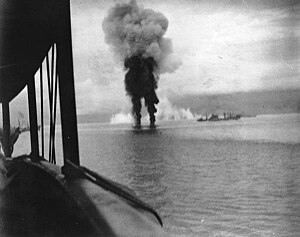First Naval Battle of Guadalcanal
| Naval Battle of Guadalcanal | |||||||
|---|---|---|---|---|---|---|---|
| Part of the Pacific Theater of World War II | |||||||
 Smoke rises from two Japanese aircraft shot down off Guadalcanal on 12 November 1942. Photographed from USS President Adams; ship at right is USS Betelgeuse. |
|||||||
|
|||||||
| Belligerents | |||||||
|
|
|
||||||
| Commanders and leaders | |||||||
|
|
|
||||||
| Strength | |||||||
| 1 carrier 2 battleships 2 heavy cruisers 3 light cruisers 12 destroyers |
2 battleships 6 heavy cruisers 4 light cruisers 16 destroyers 11 transports |
||||||
| Casualties and losses | |||||||
|
First phase (13 Nov): 3 destroyers Plus (13–15 Nov): 36 aircraft for a total of 1,732 killed |
First phase: 1 battleship 1 heavy cruiser 2 destroyers 7 transports Second phase: 1 battleship 1 destroyer 4 transports (beached first) Plus: 64 aircraft for a total of 1,900 killed (exclusive of transport losses) |
||||||
First phase (13 Nov):
2 light cruisers
4 destroyers
The Naval Battle of Guadalcanal, sometimes referred to as the Third and Fourth Battles of Savo Island, the Battle of the Solomons, the Battle of Friday the 13th, or, in Japanese sources, the Third Battle of the Solomon Sea (第三次ソロモン海戦 Dai-san-ji Soromon Kaisen?), took place from 12–15 November 1942, and was the decisive engagement in a series of naval battles between Allied (primarily American) and Imperial Japanese forces during the months-long Guadalcanal Campaign in the Solomon Islands during World War II. The action consisted of combined air and sea engagements over four days, most near Guadalcanal and all related to a Japanese effort to reinforce land forces on the island. The only two U.S. Navy admirals to be killed in a surface engagement in the war were lost in this battle.
Allied forces, primarily from the U.S., had landed on Guadalcanal on 7 August 1942 and seized an airfield, later called Henderson Field, that was under construction by the Japanese military. There were several subsequent attempts by the Imperial Japanese Army and Navy, using reinforcements delivered to Guadalcanal by ship, to recapture the airfield, which ultimately failed. In early November 1942, the Japanese organized a transport convoy to take 7,000 infantry troops and their equipment to Guadalcanal to attempt once again to retake the airfield. Several Japanese warship forces were assigned to bombard Henderson Field with the goal of destroying Allied aircraft that posed a threat to the convoy. Learning of the Japanese reinforcement effort, U.S. forces launched aircraft and warship attacks to defend Henderson Field and prevent the Japanese ground troops from reaching Guadalcanal.
...
Wikipedia
